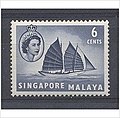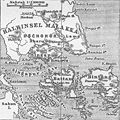Portal:Singapore
 Map of Singapore Singapore, officially the Republic of Singapore, is an island country and city-state in maritime Southeast Asia. It is located about one degree of latitude (137 kilometres or 85 miles) north of the equator, off the southern tip of the Malay Peninsula, bordering the Strait of Malacca to the west, the Singapore Strait to the south along with the Riau Islands in Indonesia, the South China Sea to the east, and the Straits of Johor along with the State of Johor in Malaysia to the north. The country's territory comprises one main island, 63 satellite islands and islets, and one outlying islet; the combined area of these has increased by approximately 25% since the country's independence as a result of extensive land reclamation projects. It has the third highest population density of any country in the world, although there are numerous green and recreational spaces as a result of urban planning. With a multicultural population and in recognition of the cultural identities of the major ethnic groups within the nation, Singapore has four official languages: English, Malay, Mandarin, and Tamil. English is the common language, with its exclusive use in numerous public services. Multi-racialism is enshrined in the constitution and continues to shape national policies in education, housing, and politics.
Singapore's history dates back at least eight hundred years, having been a maritime emporium known as Temasek and subsequently a major constituent part of several successive thalassocratic empires. Its contemporary era began in 1819, when Stamford Raffles established Singapore as an entrepôt trading post of the British Empire. In 1867, the colonies in Southeast Asia were reorganised, and Singapore came under the direct control of Britain as part of the Straits Settlements. During World War II, Singapore was occupied by Japan in 1942 and returned to British control as a separate Crown colony following Japan's surrender in 1945. Singapore gained self-governance in 1959 and, in 1963, became part of the new federation of Malaysia, alongside Malaya, North Borneo, and Sarawak. Ideological differences, most notably the perceived encroachment of the egalitarian "Malaysian Malaysia" political ideology led by Lee Kuan Yew into the other constituent entities of Malaysia—at the perceived expense of the bumiputera and the policies of Ketuanan Melayu—eventually led to Singapore's expulsion from the federation two years later; Singapore became an independent sovereign country in 1965. After early years of turbulence and despite lacking natural resources and a hinterland, the nation rapidly developed to become one of the Four Asian Tigers. With its growth based on international trade and economic globalisation, it integrated itself with the world economy through free trade with minimal trade barriers and tariffs, export-oriented industrialisation, and the large accumulation of received foreign direct investments, foreign exchange reserves, and assets held by sovereign wealth funds. As a highly developed country, it has one of the highest GDP per capita (PPP) in the world. Identified as a tax haven, Singapore is the only country in Asia with a AAA sovereign credit rating from all major rating agencies. It is a major aviation, financial, and maritime shipping hub and has consistently been ranked as one of the most expensive cities to live in for expatriates and foreign workers. Singapore ranks highly in key social indicators: education, healthcare, quality of life, personal safety, infrastructure, and housing, with a home-ownership rate of 88 percent. Singaporeans enjoy one of the longest life expectancies, fastest Internet connection speeds, lowest infant mortality rates, and lowest levels of corruption in the world. Singapore is a unitary parliamentary republic in the Westminster tradition of unicameral parliamentary government, and its legal system is based on common law. While the country is de jure a multi-party democracy with free elections, the government under the People's Action Party (PAP) wields widespread control and dominance over politics and society without much electoral competition. The PAP has governed the country continuously since full internal self-government was achieved in 1959, and currently holds a supermajority with 79 out of 93 elected seats in Parliament. One of the five founding members of ASEAN, Singapore is also the headquarters of the Asia-Pacific Economic Cooperation Secretariat, the Pacific Economic Cooperation Council Secretariat, and is the host city of many international conferences and events. Singapore is also a member of the United Nations, the World Trade Organization, the East Asia Summit, the Non-Aligned Movement, and the Commonwealth of Nations. (Full article...)Selected article -The Toa Payoh ritual murders took place in Singapore in 1981. On 25 January, the body of a nine-year-old girl was found at a block of public housing flats in the town of Toa Payoh, and two weeks later, the body of a ten-year-old boy was found nearby. The murders were masterminded by Adrian Lim, a self-styled healer who pretended to have supernatural powers and scammed people for years. He had also been sexually assaulting female clients, often preying on younger women from impoverished backgrounds. Two clients later engaged in a relationship with him: Tan Mui Choo, who he married, and Hoe Kah Hong, who was his "holy wife"—a term he used to manipulate women into having sex with him. Lim subjected them to extensive physical, sexual, mental and financial abuse, including forcing Tan into prostitution, for years before instigating the killings in which they participated. (Full article...)Selected picture The gopuram (tower) at the entrance of the Sri Mariamman Temple, Singapore, Singapore's oldest Hindu temple. The temple has been gazetted a National Monument due to its architectural and historical significance. Read more... General imagesThe following are images from various Singapore-related articles on Wikipedia.
Selected biography -
Kelvin Tan Wei Lian (陈伟联, born 5 October 1981) is a Singaporean former Mandopop singer who earned a living as a busker before he won the first edition of Project SuperStar in 2005. He has released three albums, All I Want Is... (2006), i-Weilian (2007) and Moving Notes...Kelvin Tan (2009). He also had a solo concert at the Singapore Expo, lead a choir at the opening ceremony at the 2008 Summer Paralympics, and singing Singapore's 2009 National Day Parade's theme song. (Full article...)
Did you know (auto-generated)
In this month
More did you know -
Selected panoramaA night time view of Bishan Park after its renovation under the Active, Beautiful, Clean Waters (ABC Waters) Programme. Singapore topicsRelated portalsSoutheast Asia Other Countries Tasks
CategoriesWikiprojectsAssociated WikimediaThe following Wikimedia Foundation sister projects provide more on this subject:
Discover Wikipedia using portals |





























































